Foreign Trade and Transport in Mauritania, Nouakchott, Nouadhibou
Mauritania, Nouakchott, Kiffa, Mbera, Kaédi, Zouérat, Rosso (Business), Logistics

Mauritania is a country of the Maghreb (north-west Africa)
- الجمهورية الإسلامية الموريتانية in Arabic
- Mauritanian capital: Nouakchott
- Main Mauritanian cities: Nouakchott, Nouadhibou, Kiffa, Mbera, Kaédi, Zouérat, Rosso, Sélibaby, Atar and Aïoun
- Mauritania is a link between Sub-Saharan Africa and Berber Africa (Arab)
- 20% of Mauritanians live on less than 1.25 USD a day
- Main Mauritanian economic activities: agriculture, Logistics,
fishing and mining
- The majority of the Mauritanian population depends on the agriculture and livestock for their subsistence
- The coastal waters of Mauritania are among the richest fishing areas in the world, but overexploitation by foreign companies threatens this source of income.
- Nouadhibou is the industrial fishing centre in Mauritania
- Mauritanian fishing industry: 54% of the GDP
- Mauritanian Company for Fish Commercialization
- Extractive industries: 35% of the Mauritanian economy
- Mauritania has significant iron ore deposits (50% of the Mauritanian exports)
- National Industrial and Mining Company
- Mineral train
- Gold and copper mines (inland)
- Oil was discovered in Mauritania in 2001 (off-shore field of Chinguetti)
- Mauritania imports 70% of its food needs
- Mauritania share borders with Algeria (463 kilometres), the territory of the Western Sahara, Mali (2,237 kilometres, Ségou, Timbuktu) and Senegal(813 kilometres, Senegal river, Saint-Louis)
- Morocco does not recognise the Western Sahara, reason why Morocco considers that it shares borders with Mauritania (1,561 kilometres)
Transport and Logistics in Mauritania
- Deep water port (Nouakchott)
- African Transport Corridors
- Nearest ports:
- Port of Casablanca
- Port of Dakar
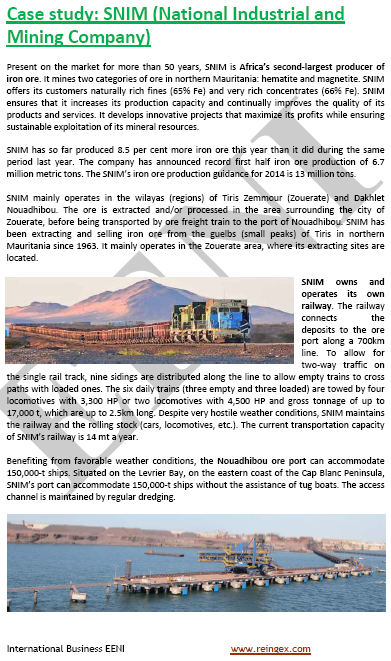
 Mauritania
Mauritania

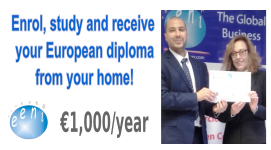
More information: International Trade and Business in Mauritania, at EENI Global Business School Website.

Trade and Business Organisations (Mauritania)
- Arab Maghreb Union (AMU)
- Community of Sahel-Saharan States (CEN-SAD)
- Organisation for the Development of the Senegal River
- G5 Sahel
- Islamic Development Bank
- Organisation of Islamic Cooperation (OIC)
- Arab League
- Euro-Mediterranean Partnership
- African Union
- AUDA-NEPAD
- Economic Commission for Africa
- African Development Bank
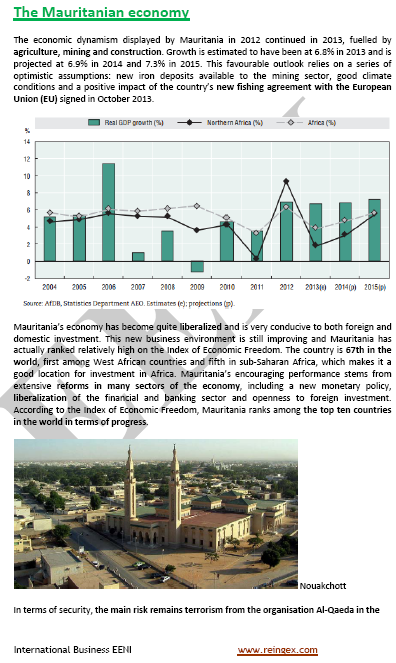
- The official language of Mauritania is Arabic
- Mauritanian area: 1,030,700 km²
- 90% of Mauritania is located in the Sahara
- Mauritania has an Atlantic Ocean coastline of 800 kilometres
- Bank of Arguin National Park (World Heritage of UNESCO)
- Desert climate
- Mauritanian population: 4,3 million inhabitants
- The population is concentrated in the south (slightly higher rainfall)
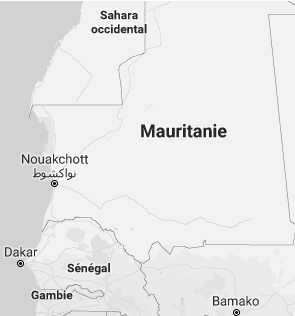
- Mauritania is an Islamic Republic
- Calling code of Mauritania: 222
- Code top-level domain: .mr
- Mauritanian currency: Ouguiya (MRO)
- Independence of Mauritania: 1960 (France)
- Mauritania = the country of the Moors Berbers (according to the Romans)
- 1981: Mauritania was the last country in the world to abolish the slavery (History of Mauritania)
- Today, slavery persists in Mauritania.
The 13 Wilayas (regions) of the Islamic Republic of Mauritania are (wilata / Capital):
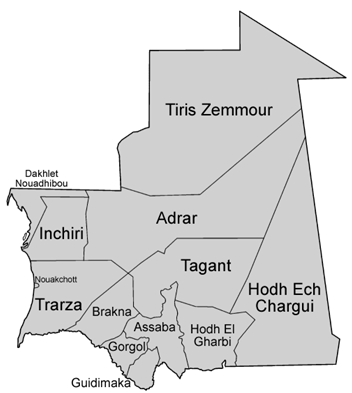
- Adrar / Atar
- Assaba / Kiffa
- Brakna / Aleg
- Dakhlet Nouadhibou / Nouadhibou
- Gorgol / Kaédi
- Guidimaka / Sélibaby
- Hodh Ech Chargui / Néma
- Hodh El Gharbi / Ayoun el Atrous
- Inchiri / Akjoujt
- Nouakchott-Norte / Dar-Naim
- Nouakchott-West / Tevragh-Zeina
- Nouakchott-sur / Arafat
- Tagant / Tidjikja
- Tiris Zemmour / Zouérat
- Trarza / Rosso
Mauritanian Ethnicities:
The Mauritanian population is composed by three ethnic groups:
Haratin (Black Moors):
- 40% of the Mauritanian population
- The language of Haratin is Arabic
- Haratin are the former black slaves descendants
Beidane (Arab-Berber Moors, White Moors):
- 30% of the population
- The language of Beidane is Arab Hassaniya
- Origine Arab-Berber
West Africans: 30% of the population
Arabic Hassaniya is the official language of Mauritania
- Pulaar, Soninke and Wolof are also national languages.
- French is widely used
Since 1999, all the primary education is taught in modern standard Arabic. French is introduced in the second year and is used to teach all scientific courses. The use of English is increasing.
Religion in Mauritania: Sunni Islam (100% of the Mauritanian population), Maliki school
- Sufi orders: Tijaniyah and Qadiriyyah
Higher Education in Mauritania:
- University of Nouakchott
- National School of Administration (Faculty of Technical Sciences)
- Mauritanian Institute of Scientific Research
- Higher Institute of Islamic Studies and Research
- Institute of Arab and Islamic Sciences
- Higher Technical Training Centre
- Higher Scientific Institute
- National Institute of Medicine Studies
Mauritania is a member of the Francophone University Agency (AUF) and the Organisation International of the Francophonie.
- Francophone digital campus of Nouakchott
 Mauritania
Mauritania
 Mauritanie
Mauritanie
 Mauritania
Mauritania


 Tweet
Tweet